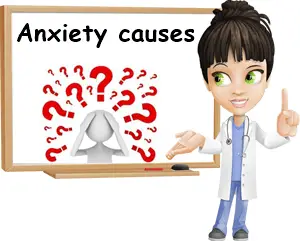Anxiety is, by definition, a combination of negative emotions that manifest as excessive or obsessive concern or fear over a future event or situation, real or imagined. Anxiety generates uneasiness, distress or apprehension in anticipation of danger, misfortune or other sorts of threats to one’s health and well-being. By its very nature, it exacerbates negative emotions to the point they become mentally and physically disabling. Experiencing anxiety repeatedly may indicate the onset of anxiety disorder.
What is anxiety disorder? Anxiety disorder is a mental illness characterized by continual feelings of uneasiness, distress, apprehension, fear, dread and variety of other negative feelings that impact all aspects of one’s life. Anxiety disorder may take on various forms, depending on what the target of one’s fear and distress is. Common types of the disorder include social anxiety, generalized anxiety disorder, panic disorder etc. The condition is also characterized by an incessant restlessness or anticipation of an unfortunate event. It is this unending fear of misfortune that makes anxiety disorder crippling and difficult to address.

What anxiety does is compromise one’s ability to function normally within society, but also at personal level. Despite being a mental illness, it produces both psychological and physical symptoms that may become severely crippling and drive sufferers to consciously avoid certain situations, social events, people etc. It is not uncommon for anxiety sufferers to slip into depression or develop other mental disorders.
What causes anxiety?
There isn’t actually just one cause for anxiety, but rather a multitude of risk factors or triggers known to contribute to the onset of the disorder. It’s thus possible for one or several of the following causes to lead to anxiety:
1) Changes in brain chemistry. Mental illness can alter normal brain chemistry. This would explain why anxiety sufferers can’t seem to shrug off their inexplicable fear over future events or situations, real or not. This is also why people suffering from depression find it so hard to get over their overwhelming sadness, hopelessness and helplessness, despite realizing there is no foundation to these feelings.
2) Traumatic life events. A physical trauma (such as a driving accident, an illness) can leave such a lasting imprint on a person that it can cause an inexplicable and insurmountable fear of everything that has had to do with or has built up to that traumatic event. An emotional trauma (such as the death of a loved one, a separation, being laid off) can have such a deep emotional impact that it can cause us to question our life choices, our abilities or financial security to the point that it leaves us in constant fear of what might happen.

3) Personality traits. Different personality types may have different risks of developing anxiety disorder according to the personality traits they exhibit. For example, Meyer Friedman’s Type A and Type B personality types. Type A personality refers to individuals that are competitive, impatient, driven, proactive and even aggressive and thus more susceptible to being anxious over missed deadlines, lost competitions, delays, failure etc. Type B personality refers to more laid-back, relaxed individuals who are more likely to not stress over anything and thus not become anxious over failure. Similarly, other classifications of personality types may indicate a higher or a lower risk of developing anxiety disorders.
4) Environment. Our surroundings have a say in who we are, what and how we think and behave. This includes how we respond emotionally to various elements, events or situations in our life. Our social environment, physical surroundings, cultural background, family upbringing, education etc. may all have a say in how anxious we are.
5) Upbringing (nurture). Our early formation can set the direction for our future emotional and mental health. For example, more traditional values or beliefs may make us more anxious towards less traditional social environments or behaviors. A more conservative or strict upbringing may have us react in a certain way to various social structures. Of course, nurture may be trumped by nature or both by personal growth and development.
6) Biological factors. Psychology reasons that temperament, mood, personality (even motivation) are at least partially biologically determined. This would mean that our nature has a say in how we react to stress, how we behave in response to stressful situations, how we respond to other people and simply see the world. In other words, some of us might be more inclined to fall pray to anxiety than others. For example, if we are more likely to generally be in a good mood and have an optimistic view on life, we might just be less likely to give in to anxiety even in extremely stressful situations or more likely to recover soon and revert to our natural state of optimism or good humour.
7) Genetics. Anxiety may be inherited from one or both parents. If one parent has anxiety, it’s very likely for at least one child to have it or develop it at one point in their lives as well.
8) Age and experience. Maybe we were a cheerful child, but as we grew, responsibilities and difficulties in life have made it hard for us to preserve a positive attitude and positive thinking and made us more likely to expect bad things to happen or to have difficult experiences in general. Our life experiences shape us and may contribute to changing our very nature.
9) Personal development. I was a relatively cheerful, but very fearful child. Since I can remember, everything scared me and I could get anxious about every little thing. As I grew older, my anxiety grew too and I got to the point that I couldn’t function. I was terrified of gatherings of all sorts, people, social interaction, human interaction, school, making appointments, having friends, you name it. I felt I was falling deeper and deeper into fear, despair, helplessness and it all felt both surreal and very real, not to mention exhausting.
And then one day I simply decided I couldn’t go on like that and resolved to make small changes to overcome my crippling anxiety. So I pushed myself a little every day and slowly rewired my thinking because I knew I was not okay like that. It took a lot of effort and determination, not to mention time and courage to fight the way I was, but I am now in a much better place.

Symptoms of anxiety
What are the signs and symptoms of anxiety? Anxiety is an emotion just like happiness, fear, trust, worry, love, affection, envy, frustration etc. In other words, it is normal to experience anxiety in anticipation of a distressful situation. But it’s only normal to experience it occasionally.
When does anxiety become a disorder? Feeling anxious often, either in response to the same event or situation or to various types of situations, may indicate an anxiety disorder. Depending on the target of one’s anxiety and how it manifests emotionally and physically, one or several of the following signs and symptoms are possible.
1) Overthinking everything. Excessive worrying, preoccupation.
2) Avoiding social events, interaction, people, places, transportation means etc.
3) Avoiding having to make appointments, speak to a group, use a machine etc.
4) Obsessing over the possibility of something going wrong all the time.
5) Fear of the unknown or of new situations.
6) A state of constant tension, restlessness and stress.
7) Nervousness, agitation, insecurity, self-doubt.
8) Vulnerability and irritability.
9) Sleep loss and disturbed sleep.
10) Brain fog, inability to concentrate, confusion.
11) Fast heartbeat, pounding heart, palpitations, high blood pressure, shallow breathing.
12) Butterflies in the stomach sensation, lump in throat feeling (globus sensation).
13) Lightheadedness, dizziness, fainting sensation.
14) Profuse sweating, hot flashes, cold sweats or chills.
15) Dry mouth, difficulty swallowing.
16) Nausea, sweaty palms.
17) Trembling, shivers, pins and needles sensations in extremities.
18) The sudden need to go to the bathroom and have a bowel movement, stress diarrhea.
19) Nail biting, pulling the skin around the nails, biting the lips.
20) Feeling like you’re drowning in your own thoughts, like you can’t breathe.
Feeling utterly and completely overwhelmed by everything.
Anxiety sufferers may easily slip into depression or co-develop other mental disorders such as obsessive-compulsive behaviors, eating disorders, post-traumatic stress disorder, sleeping disorders, irritable bowel syndrome, fibromyalgia and others.
Anxiety types
Depending on the target of one’s anxiety, the disorder may be classified as follows.
1) Generalized anxiety disorder.
2) Social anxiety disorder.
3) Phobias.
4) Obsessive compulsive disorder.
5) Panic disorder.
6) Post traumatic stress disorder.
Treatment options
Treatment may vary from person to person. Anxiety in itself is fairly complex and difficult to address. The chances of it occurring simultaneously with another mental disorder makes it even more difficult to address. After thorough examination, a medical professional may prescribe specific medication to help treat potential brain chemistry imbalances but also keep certain symptoms under control. But medication is not enough. Counseling, therapy, the support of one’s family, friends and community, the desire to get better and the opportunities to do so can all contribute to recovery. Depending on one’s symptoms, herbal remedies and various alternative therapies that promote relaxation may also help.
Overall, anxiety treatment is complex and requires:
1) Medication (taken only at the advice and under the supervision of a medical professional).
2) Therapy to manage symptoms.
3) Having the support of family, friends, coworkers, community members.
4) Herbal remedies that promote relaxation: teas, aromatherapy etc.
5) Alternative therapies: color therapy, massage therapy, taking up hobbies.
6) Giving yourself time and trusting that things will work out alright.
7) Avoiding stress at home, at work.
Conclusion
Anxiety is crippling and nondiscriminatory. Although women are more prone to developing it, it’s just as overwhelming for both men and women. Symptoms can range from mild to severe and easily get out of control, reaching a point where the anxiety simply takes over one’s life. Coming out of it is difficult and takes time, patience and great effort. But it’s possible and the results rewarding. Having the support of loved ones can make the process easier and the difficult times more tolerable.
